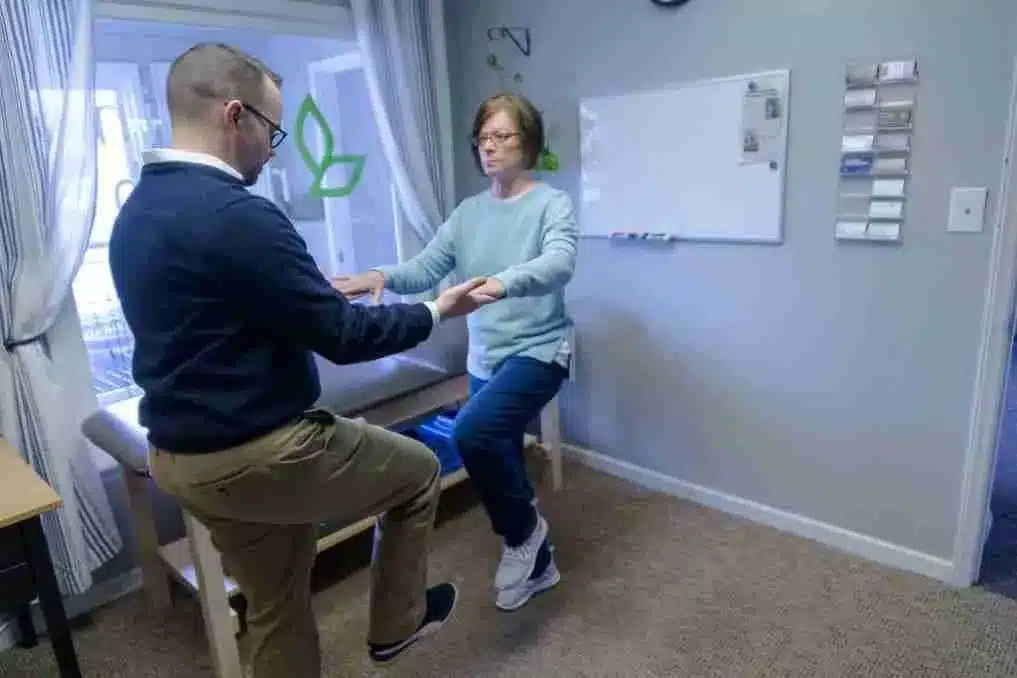With recent celebrity deaths linked to falling, we wanted to highlight the risks and dangers of falling in senior adults. Even more important, we wanted to help you move beyond being afraid of falling to understanding your real risk and develop a plan for safer mobility.
Origin Rehabilitation is a recognized expert in prevention of falls for seniors. Our physical therapists have presented at the North Carolina Assisted Living Association Convention and other professional organizations teaching others fall prevention strategies for older adults. Our team has helped numerous clients physically recover from their falls and has prevented countless more. We are excited to do the same for you.
What Increases Risk for Falls in the Elderly
Falls have been studied for a long time. Fortunately, a great deal of information is known about the circumstances that lead to older adult falls.
Top Risk Factors for Falls in Adults Over 65 Years:
- One or more previous fall
- Fear of falling
- Use of multiple medications or use of common medications for anxiety and depression
- Weakness or loss of strength
- Use of an assistive device like a cane or walker
- Pain with activity
Each of these risk factors increases a person’s fall risk on its own. The presence of more than one of these only increases risk further.
How to Address Non-Physical Risk Factors for Falls in the Elderly?
Healthy adults over 65 years without ANY other risk factors have a 1 in 4 chance of falling in any given year. Risk for falls only increases with age (even in spite of good health) and when other risk factors are added to the mix.
There’s not much that can be done about the past, so your personal history of falls will be one risk factor that remains. However, some research suggests that the greater time since you’ve experienced a fall, future falls become less likely.
A fear of falling is rooted primarily in the future but based on past experience and current ability. Often, the treatment provided to address other risk factors helps to reduce our clients’ fear of falling.
Prescription medication is outside the scope of our training and expertise. We do encourage clients to talk with their medical provider about their medications often to ensure they’re on only the medications and dosages needed and not more.
How We Address Risk for Falls in Older Adults?
While we can’t expect to keep the same strength at 75 as we had at 25 and age commonly brings conditions like arthritis that can cause pain, these should not stop an older adult from participating in activities you enjoy.
Often, improving strength through common movement patterns can help to reduce pain as well. Instruction in technique may be needed to improve mechanics and this is exactly where a physical therapist will commonly focus treatment sessions for fall prevention.
Application of strength is another way to think about balance and better balance is often what is needed to reduce reliance on the cane or walker. We like to use these strategies in sequence usually in the same visit for our clients: address strength then teach the client how to move through a particular movement pattern using that muscle group.
Summary
- Even healthy older adults over the age of 65 have a 1 in 4 chance of falling in a given year. It’s important to know any additional factors that can increase your fall risk.
- Falling is not inevitable. It is not a “sentence.” Proactive steps can be taken to modify your risk in your favor. Some steps can be taken on your own (if you feel comfortable). Others may need the help of your medical provider or a physical therapist.
- Movement is medicine in that it can help with pain, strength, and balance. This way, we may even be able to reduce your need for your cane or walker.
- If you’re concerned about falling and don’t know where to start, hire a physical therapist experienced in working with older adults to lower your fall risk today. Start here (Get to Know YOUR Risk for Falls)



